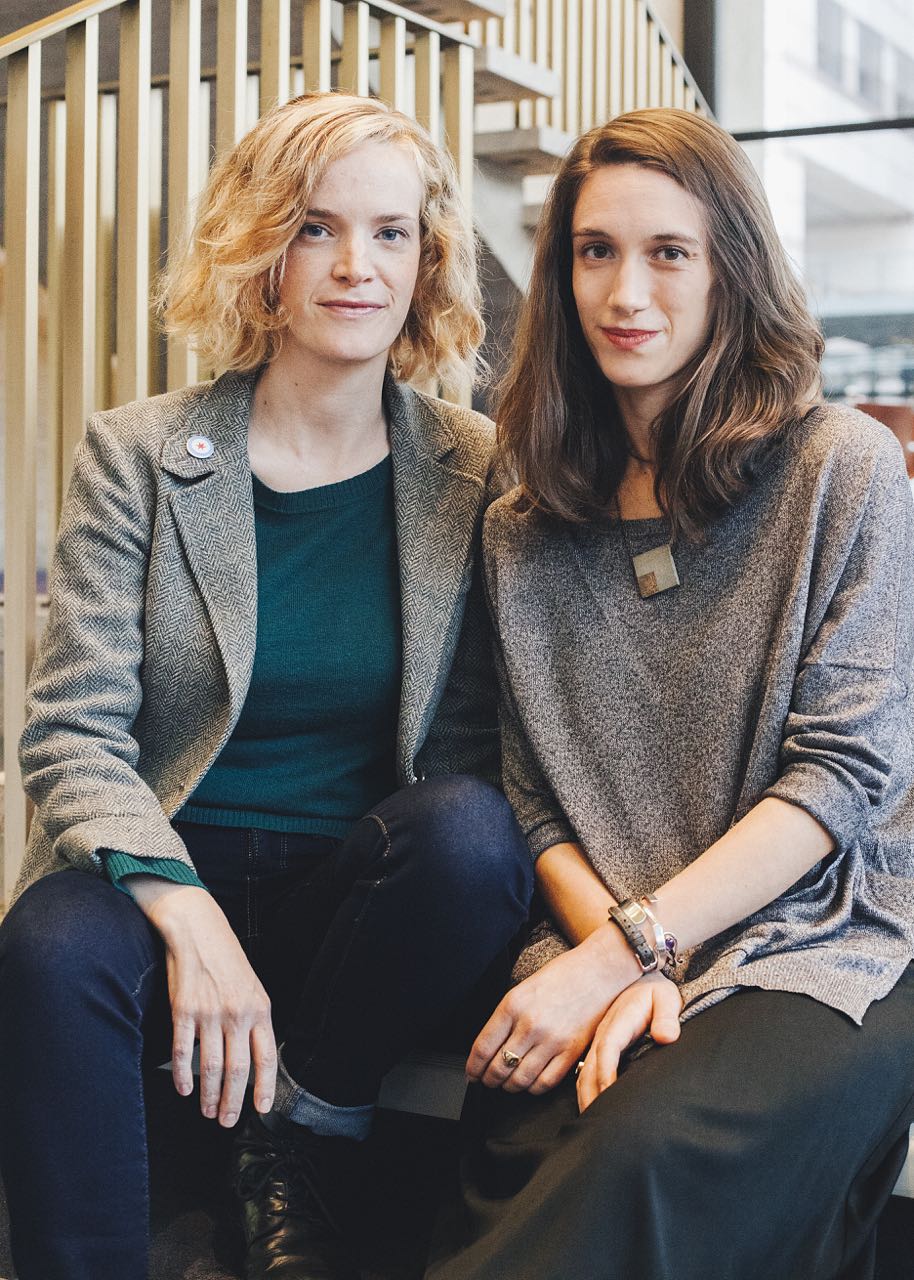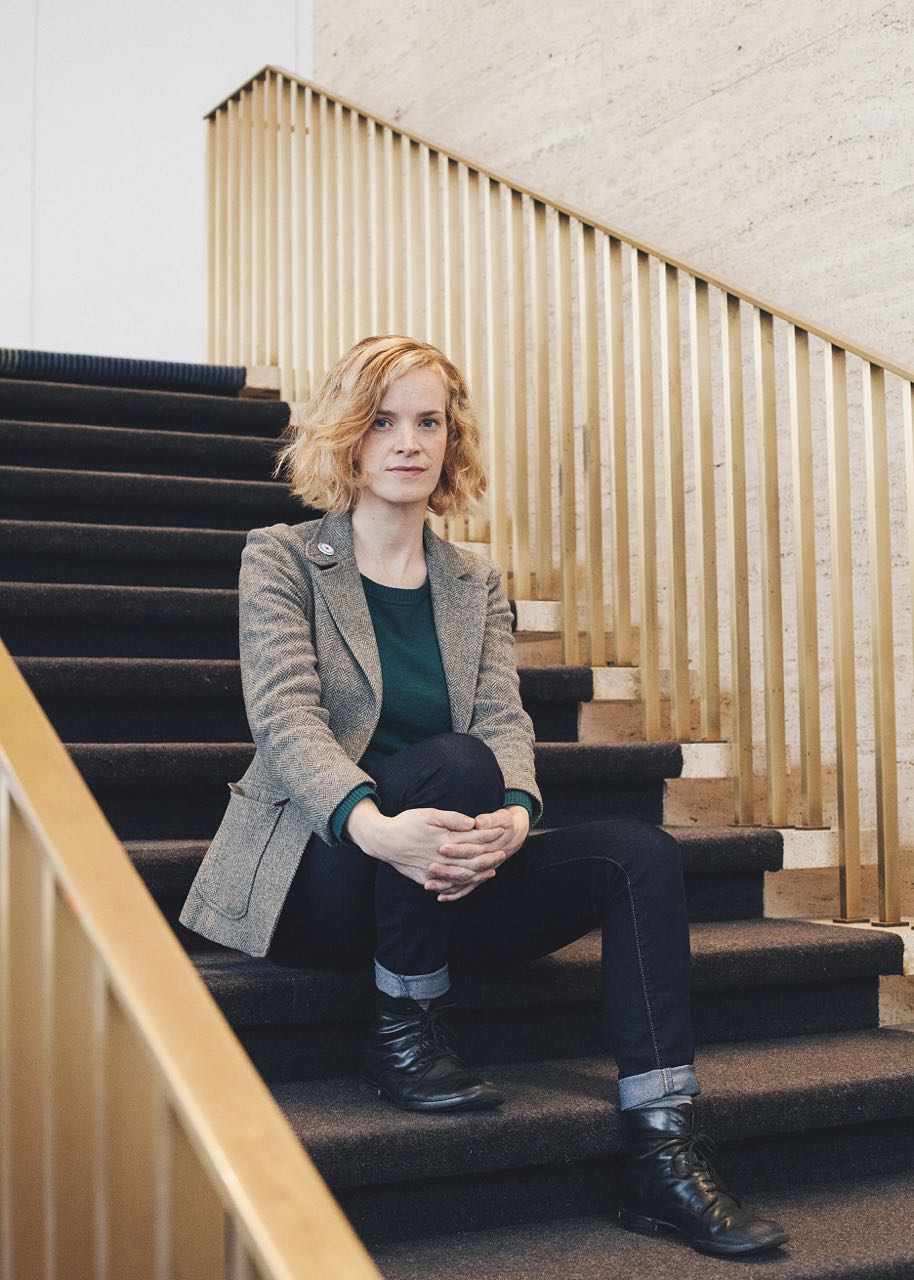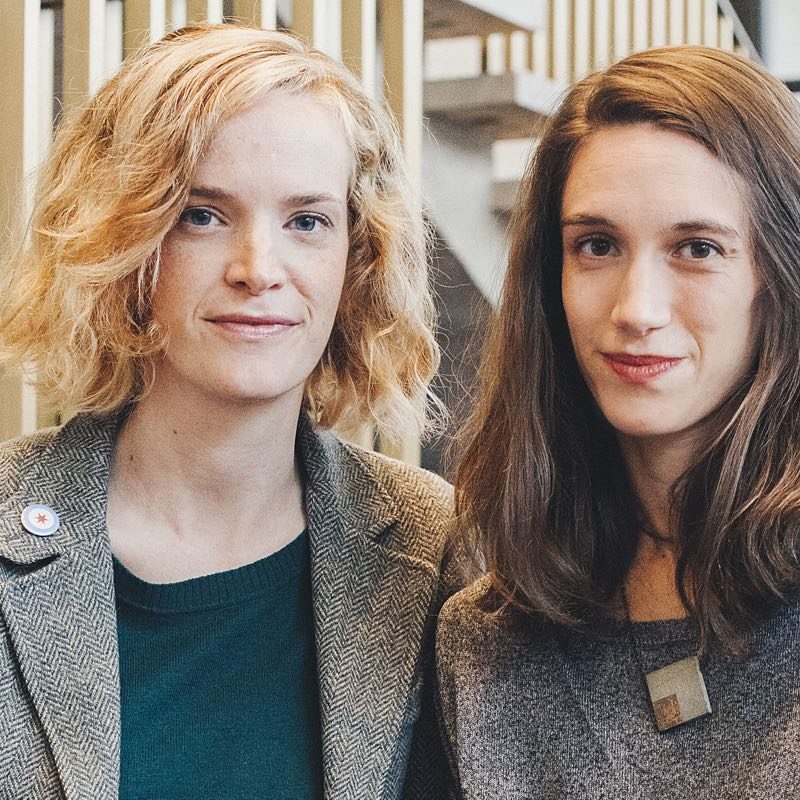Miranda Rose Hall and Margot Bordelon on Plot Points in Our Sexual Development

November 1st, 2018
On a recent October evening, I sat down with playwright Miranda Rose Hall and director Margot Bordelon to discuss their latest work, Plot Points in Our Sexual Development at LCT3. The show, which is described by LCT as “a contemporary queer love story” explores the intricate rapport between a Cecily, a cisgender lesbian and Theo, who is genderqueer. During the course of our conversation, it occurred to me that I hadn’t ever seen the intricacies of Cecily and Theo’s relationship explored onstage before. The particular challenges that Cecily and Theo faced were ones I had never really known much about. I realized that a play like Plot Points felt long overdue. Later that same weekend, the Trump administration expressed an intent to redefine gender in a way that would erase the existence of transgender identity, taking away basic federal protections and civil rights. As theatre critic Jesse Green wrote in his review of the show, “This news reminded me of why a play like this can be so important.” Sometimes the most important subject matters can be the scariest topics to write about. In my conversation with Miranda and Margot, they revealed what it was like to write and stage a play that addresses very personal, vulnerable subject matter, how their collaboration was full of love and easygoing rigor, and more.
Miranda, what was the genesis of this piece for you? Had you wanted to specifically explore the structure of a two person show, or to address themes of queer sexuality?
Miranda: I wanted to challenge myself to write a play about the last thing I ever wanted to discuss in public. I had been working on another play, and the acting coaches on that play kept encouraging the actors to talk and listen to each other. I hadn’t thought about that before, about that aspect being an essential facet of theatre. There was a lot of change and transition happening in my life; things got very chaotic, and I really wanted to get back to the essentials of talking and listening. I wondered what would happen if I took that as a prompt for myself for a play. Then I realized, if I would be talking and listening, and asking people to listen, then I would probably be writing a language-based play. And if I was writing a language-driven, talking-listening play, I needed to light a fire under my butt, and talk about the last thing I would want to discuss, so that I had some vulnerability, and a little bit of danger, and some excitement, and had some skin in the game. It occurred to me that the last thing I would want to discuss would be queer sexual development. I started going inside of my own memories and imagination about sexual development, doing some mining of my own story, and the stories of my friends, and pretty quickly I realized that I was trying to write about a queer couple that I hadn’t seen on stage before. It’s funny, you think that you know everything about a play, and then you just don’t. Over time, I realized that what I was trying to talk about was vulnerability, and honesty, and the specific dynamics that can emerge in a trans-masculine gender-queer and queer-cis-female relationship. I had never seen those on a stage before.
What was it like for you to explore a topic that was so “off limits”? How did you go about tricking yourself into putting something down on paper?
Miranda: When I sit down to write a play, I’m very motivated by the fine line between fear and excitement. If I’m just afraid of something, and I’m not excited about it, then it’s likely that I won’t actually take on the subject matter. If I’m just excited about something, and I’m not really afraid of what it would demand of me, then I’m also not likely to take it on. I have a very private and rigorous writing practice. I start writing everything out by hand, and I sit in my movement clothes on the floor in my house, and I keep track of every hour that I work. I try to work for sustained chunks of time, without checking my email or talking to anybody else. I have a lot of rituals in place to create a private sanctuary. Carving private writing time out of the private hours of the day, which for me are [in] the morning, gives me the safety that I need to explore things that are scary. I fill in a book by hand with everything that feels like it’s somehow related to the play that I’m writing, and I just try to freeform. And then I start to test the waters by telling some of my friends what I was thinking about. I’ve got a great queer community and I’d be like, “I think I’m writing about like, queer sexual development.” And my friends were like “That sounds awesome. I would see that play!” Sometimes, people would even offer me some of their stories, which gave me the confidence that [my play] might be worthwhile one day.

Margot, how did you first get connected with Plot Points?
Margot: Lincoln Center was already going to produce it. Evan [Cabnet, LCT3’s Artistic Director] sent me the play, and I read it, and loved it. And then we Skyped. We had a Skype call when I was in Brooklyn and Miranda was in Baltimore. So, that’s how we originally linked up.
What was it that drew you to the play?
Margot: So many things. I was really attracted to the raw honesty of it. Miranda has such a strong facility with language. It feels both very poetic and very conversational at the same time. I was really drawn to the vulnerability of this piece, and I actually also found it titillating. There are sexy things that are talked about, and it does feel dangerous in the theatre. The moment that someone says “cunt,” which is a line from the play, there is going to be complete silence because it is a dangerous word. People get uncomfortable in their skin about how they’re supposed to receive it when they’re in a public space, and so it’s been a really interesting process to see how long people laugh in this play, and then where it turns to silence. That isn’t necessarily an experience that I knew was going to happen when I first read it on the page. I just found it so relatable, and it immediately made me cycle back through my own history of sexual development. I found so many parallels within my own life and what she was writing about.
You mentioned the tone of the play. Plot Points draws the audience in with a lot of humor at first, but the audience comes to realize that something more serious is going on subtextually. How did you approach that tonal shift in rehearsals?
Margot: One of the challenges is how to find that balance of playing the stakes of the situation at the beginning of the play, even though the audience doesn’t yet know the circumstances. But we all know the circumstances. Having those opening stories warmed the audience up enough that then it’s a surprise when the change in tone does occur. It’s gone through multiple iterations where we were playing really high stakes at the beginning, and it wasn’t necessarily as funny. It’s been a process of calibration. Even when I was watching last night, because we’re still in previews, I was like, “Oh, now it’s feeling too comfortable for them at the beginning.” So much of what we’ve talked about with the actors is this idea of the play within the play. These stories are being told, but what’s the subtext of the stories between them? What are the questions they’re asking the other person? What’s the need underneath telling this story? What part of them are they trying to expose so that the other person can see them more clearly? It feels like it’s a simple play, but it’s actually so deeply complex in trying to activate the stories in that way. There’s actually conflict, an obstacle, going on underneath the stories as well, between the two characters.
What are the challenges of staging a play with a relatively bare set [comprised of little more than two chairs] and seemingly little character interaction [the characters appear to be in their own worlds, speaking in monologues] for much of the piece?
Margot: Well, it’s very interesting you ask that because it didn’t used to be two chairs. It used to be two chairs, and a loveseat, a rug, and a little table. It was always them isolated at the beginning, and then them setting up this entire apartment. And then, I thought, “This is the worst thing I’ve ever directed.” This is distracting from what the story is. We have to embrace the simplicity of them sitting in chairs talking to one another. So, it’s become really essentialized, really distilled. And now, in retrospect, I think that was actually a part of the process that we needed to go through, so they could actually feel the geography of the stories with their bodies. Now, they’re sitting in a chair but some of the key gestures that we discovered when it was fully staged are still alive, just in the chairs. So, it still feels alive.
Miranda: I found that this subject matter is so unwieldy to me that I desired a profound constraint, which I think is where the close time two-hander comes from. I was really glad that we went through that whole process and they discovered the physical language on a much larger scale, and that the change that we made was just scaling all of that down as needed, rather than trying to scale up. It made it feel like they were already inhabiting themselves when they sat down to tell the story.
Margot: Because these characters have lived through these experiences, and so there was something about embodying the stories that allowed for those experiences to be more alive.
What has the dynamic been like for the two of you throughout this process? How would you describe your collaboration?
Margot: We had really open conversations about [the play].
Miranda: Margot is sharp and effusive, which I like. I needed that. I feel comfortable with [her].
Margot: Yeah, raw and vulnerable conversations, and I felt comfortable with Miranda because she had written this brave piece. So, it felt like an invitation to…
Miranda: Overshare?
Margot: To overshare! Absolutely. To share personal stories, and personal details, and personal feelings, and because the characters are in a kind of emotional extremis, you just have to go there with them. We really investigated what the circumstances were between them, talked about the emotions alive in that. There was nothing that was off limits.
Miranda: And I think we’re both very demanding of ourselves, which is something that is critical for me in a collaboration. [Margot is] doing a really rigorous, deep investigation on her side and I’m trying to do that on my side. I felt very at ease, knowing that Margot was going to be very intense.
Margot: Our shared neuroses were a comfort for each other.
Miranda: Yes. We freak out about different things, but they sync up.
Margot: I think we both have high standards for ourselves and others.
Miranda: Yeah. Hopefully without being cruel.
Margot: But I also feel like that was a part of our dynamic too; we had a really warm, open, and safe rehearsal room. And I feel like that was bred from both of us.
Miranda: Easygoing rigor. That’s what we want.
Margot: Yeah, love and rigor. And our actors are so wonderful and warm and generous and brave, and were just so fully game and on board.
Miranda: [Our actors are] very generous. They dove in, asked a lot of questions. They really respect the characters, and they really respect our process. [There’s been] a lot of kindness and respect, which feels very special.

You’re writing about events that may have initially been rooted in your own life circumstances, or those of your friends. How do you navigate watching the actors bringing such personal material to life?
Miranda: It’s not autobiographical, but it is close to home, and it’s very liberating to see strangers embody it so personally and entirely. I feel quite certain that it is the story of these two characters that a team of people has imagined and envisioned together. I had this dream when I was writing; I was lying down in some dirt and the characters, Theo and Cecily, came and buried me in the dirt, and then they grew out of it. So I was in there, but what we saw coming out of the ground led to beautiful characters, who were their own crop.
Margot: Any actor that’s taking on a role, even if you’re playing the antagonist, although this play hasn’t got an antagonist, you have to find a way they get inside them, understand them, empathize with them.
It’s interesting that you say this play doesn’t have an antagonist because it had possibly seemed to me that society was the antagonist.
Margot: Yeah, our patriarchal, binary conditionings.
Miranda: I feel there are antagonistic pressures that both of these characters are trying to navigate, but it’s a conflict of “How do we love each other?,” which can be as complicated as antagonism.
I know that you’re still in previews, but what sort of reactions have you been getting from audience members?
Miranda: One of the most meaningful reactions was a friend who said “Wow, I really have a lot to think about considering my own sexuality and how I think about sex; I feel like there’s a lot that I haven’t considered.” I found that very meaningful. And someone who said that she felt like she could’ve read an article that addressed a lot of the same issues that come up in the play, but that encountering that in fiction, with a story and two people that you care about, made it so much more expansive for her.
Margot: I’ve been really moved by the number of straight cis men who have said how much they actually understand Theo and where Theo is coming from, and this struggle of not knowing how to express your “masculine desires” without being oppressive. And I’m like, “Yes! the message is being received!”
Miranda: Yes. I’ll echo that. I have a lot of guy friends who really relate to this question of, “How am I supposed to be a man?” Or, “What is good, positive masculinity right now?” I think that’s a very scary subject matter for us all to consider, now in particular. It is very moving that cis men have something to learn from a trans-masculine character about masculinity.
What could the theatre industry do to improve trans awareness?
Margot: Miranda wrote a really great fucking role for a trans actor. More roles have to be written. That’s how more people get through the doors, and then the gatekeepers let you choose those plays. I feel like Evan Cabnet responding so enthusiastically to this play, and programming this play, is one step. Evan is a gem. We love Evan; he’s a brilliant genius.
Miranda: One thing is theatres talking with each other, and maybe even putting aside more resources about how and where to employ trans performers. Because it’s one thing to cast this play in New York; it’d be a totally different question to cast it in my hometown, Baltimore, because the talent pool is just very different. I think that theatres can be creative about how they allocate their resources. Maybe performing this play around the country will mean flying in performers from larger cities, where there’s more opportunity for trans artists to survive, and flying them into places without as rich of an acting pool. Or talking with one another about supporting the local ecology of queer performers, which can happen in a lot of different ways. But if those conversations happen in isolation, then there will be too many reasons not to produce a play like this. I think that it would have to involve a larger collaboration about how we can make this possible.
What have you learned from working on this play that you’ll take with you, moving forward, in your future artistic goals and projects?
Miranda: Taking a risk with love to talk about something scary can help build warmth, love, and community, which is what I feel I’ve found with this team. And I think that’s very empowering, to tackle dangerous material.
Margot: There’s such a seduction to bells and whistles; it’s so refreshing, and humbling, and focusing to work on a piece that’s just about the words and the acting. It’s scary. It’s actually more exposed; there’s nowhere to hide. So, it’s been going back to the gym, in a lot of ways, just with working on acting, working on physicality, working on specificity of language, which, at the end of the day, are the most important things. It doesn’t matter how many flashy costumes or lighting changes you have, if the story isn’t good, then there’s no reason to be putting on the play.

